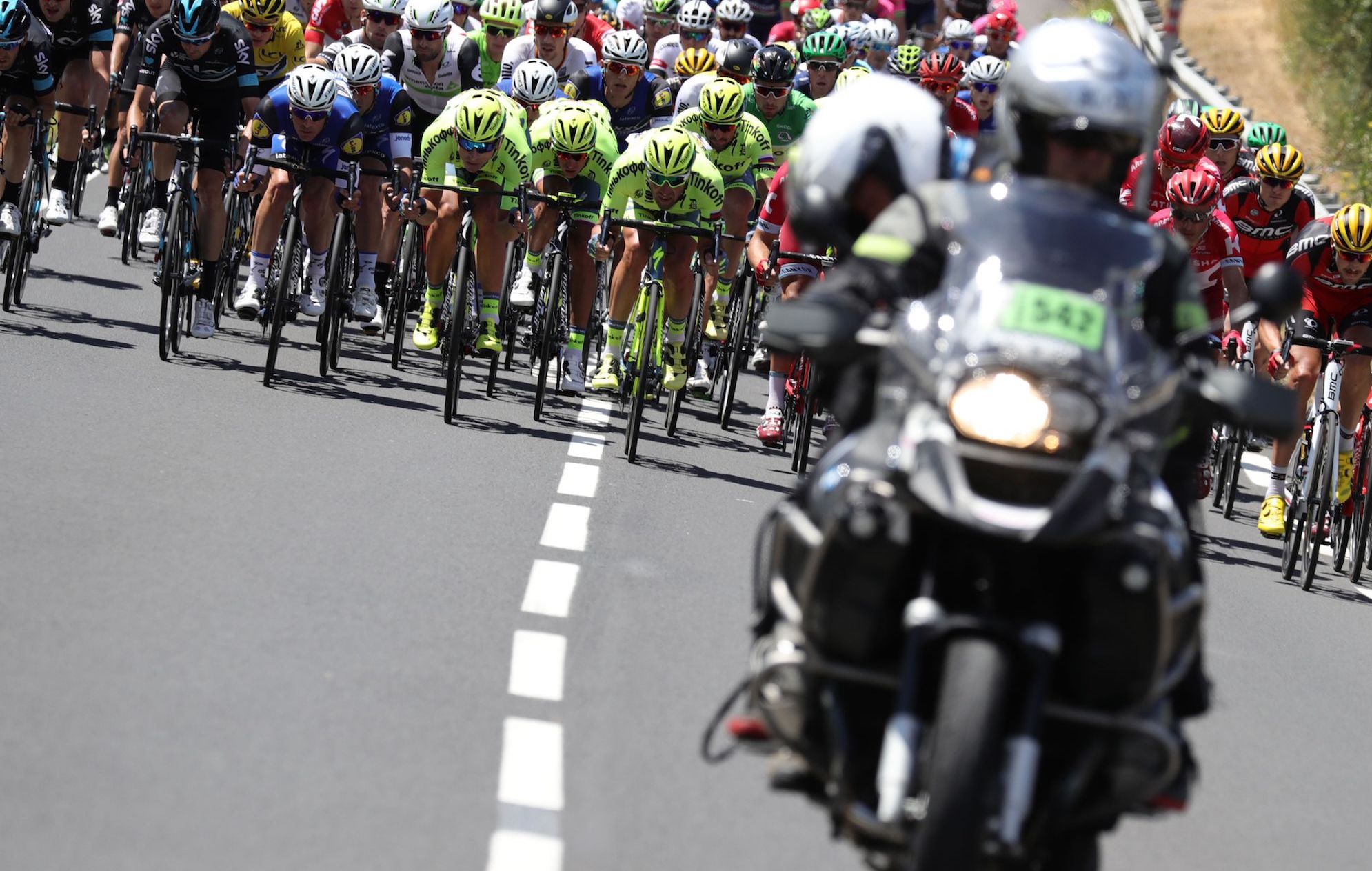New research shows just how much motorbikes affect races
For the first time an experiment shows exactly what the advantage is when a motorbike drives in front of a rider

Stage 11 of the Tour de France 2016 (Kenzo Tribouillard/AFP/Getty Images)
The latest race content, interviews, features, reviews and expert buying guides, direct to your inbox!
You are now subscribed
Your newsletter sign-up was successful
After a rider has attacked off the front or is closing in on the finish line after a long breakaway effort, it's not uncommon for the motorbike camera to stay in front of them to capture the emotions the rider is going through as they sail towards potential victory.
This often draws complaints that motorbikes can unfairly influence races but until now this has only been an accusation, with no real science behind it.
>>> UCI to halve amount riders pay in fines
Research has finally been completed that for the first time tells us exactly how much a cyclist gains from riding behind a moto.
A cyclist riding two and half metres behind a motorbike experiences a 48 per cent reduction in drag, equating to more than two seconds gained for every ten seconds, while a cyclist riding 30 metres behind a motorbike has their drag reduced by 12 per cent gaining 2.6 seconds with every passing minute.
If a rider is cycling at 54km/h without a motorbike in front then the presence of a motorbike will allow them to ride at 67km/h, providing a time gain of 14.1 seconds every minute.
As the distance between the motorbike and cyclist increases the advantage becomes smaller, but even when the motorbike is 50 metres away a seven per cent reduction in drag is still experienced, which equates to a gain of 1.4 seconds per minute.
The latest race content, interviews, features, reviews and expert buying guides, direct to your inbox!
Professor Bert Blocken of Eindhoven University, who was part of the research group, said the research shows "even if a motorcyclist only rides for a few seconds in front of the riders, a considerable time advantage can still be gained. For a rider cycling for 10 seconds at two and half meters behind a motorbike, this gain can exceed two seconds."
The experiment was conducted using two methods to independently prove the results, using both a computer simulation and measurements in a wind tunnel.
The time gains above were measured and calculated without the anticipation of head wind, tail wind or crosswind, but Blocken says that if there is a head wind the time gains are larger, a tail wind makes the gains smaller and a crosswind makes it more difficult for a rider to get in the motorbike's slipstream.
Blocken said: "We repeated the wind tunnel measurements and our calculations a few weeks after the first tests because I couldn't believe the size of the effects. But we always found the same results. Because races are sometimes decided by seconds, these differences can determine whether you win or lose. The often-heard complaint that motorcycles can influence the outcome of races is therefore justified."
In 2017, the UCI introduced new rules for motorbikes and cars in races in order to try and improve rider safety following a number of incidents where race vehicles have collided with riders, causing serious injury.
Many of the new rules were concerned with the way in which vehicles are allowed to move around and among riders on the road, with diagrams provided to help illustrate how to do this safely. Instructions were also included on how to prevent drafting.
Vincenzo Nibali (Bahrain-Merida) suffered a fractured vertebrae following a crash with a motorbike on stage 11 of the 2018 Tour de France.
In the aftermath Bahrain-Merida said they would pursue a legal case against race organisers ASO, saying situations such as what happened to Nibali are unimaginable in any other sport.
Jonny was Cycling Weekly's Weekend Editor until 2022.
I like writing offbeat features and eating too much bread when working out on the road at bike races.
Before joining Cycling Weekly I worked at The Tab and I've also written for Vice, Time Out, and worked freelance for The Telegraph (I know, but I needed the money at the time so let me live).
I also worked for ITV Cycling between 2011-2018 on their Tour de France and Vuelta a España coverage. Sometimes I'd be helping the producers make the programme and other times I'd be getting the lunches. Just in case you were wondering - Phil Liggett and Paul Sherwen had the same ham sandwich every day, it was great.